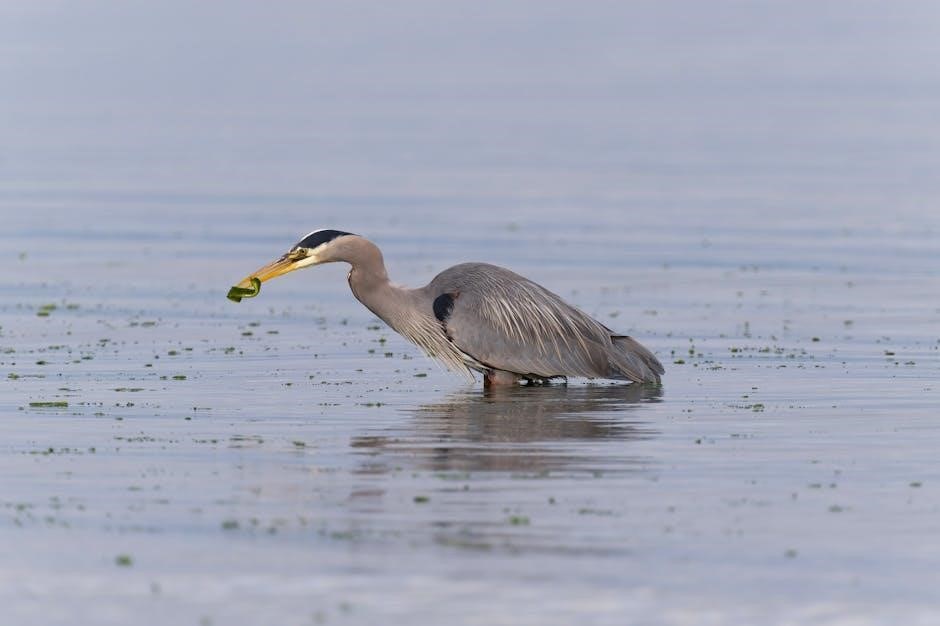
how to become a hunting guide
Becoming a hunting guide requires a deep passion for the outdoors, extensive knowledge of wildlife, and strong interpersonal skills. It demands dedication, hard work, and a willingness to learn. Guides must possess expertise in hunting techniques, safety protocols, and wilderness survival. Mentorship and practical experience are crucial for success in this rewarding yet challenging career.
1.1 Understanding the Role of a Hunting Guide
A hunting guide is responsible for ensuring safe, successful, and enjoyable hunting experiences for clients. This role involves extensive knowledge of wildlife behavior, habitats, and legal regulations. Guides must excel in communication, leadership, and problem-solving to meet client expectations. Their duties include scouting locations, tracking game, and teaching hunting techniques. A guide must also prioritize safety, environmental ethics, and adherence to hunting laws, making them both educators and mentors in the field.
1.2 Importance of Passion for the Outdoors
A genuine passion for the outdoors is vital for aspiring hunting guides. A deep love for nature, wildlife, and rugged landscapes fuels dedication and resilience in this demanding career. Guides who are passionate about the outdoors can inspire clients, share their knowledge enthusiastically, and maintain the drive needed for long hours in challenging environments. This passion also fosters a commitment to conservation and ethical hunting practices, ensuring a meaningful and sustainable connection to the wild.
Education and Training
Enroll in wildlife management or outdoor recreation courses and complete guide training programs to gain essential skills and knowledge for a successful hunting guide career.
2.1 Enrolling in Wildlife Management or Outdoor Recreation Courses
Enrolling in wildlife management or outdoor recreation courses is crucial for gaining foundational knowledge. These courses cover ecology, animal behavior, and conservation, essential for understanding habitats and hunting practices. They also teach survival skills and environmental ethics, preparing you for the demands of guiding. Additionally, they provide practical insights into managing wildlife populations and maintaining sustainable ecosystems, which are vital for a hunting guide’s success and ethical practices.
2.2 Completing a Guide Training Program
Completing a guide training program is essential for developing the skills needed to lead successful hunting trips. These programs teach advanced hunting techniques, survival strategies, and client management. They often include hands-on training in wilderness navigation, animal tracking, and safety protocols. Mentorship from experienced guides helps refine your abilities, ensuring you can handle diverse outdoor scenarios effectively. Such programs build confidence and prepare you for the challenges of professional guiding.
Gaining Practical Experience
Gaining practical experience is vital to becoming a skilled hunting guide. Hands-on learning and time in the field help build expertise and confidence. Working with experienced guides and understanding animal behavior are key to mastering the craft and ensuring successful hunting trips.
3.1 Volunteering or Interning with Experienced Guides
Volunteering or interning with experienced guides offers invaluable hands-on learning. By assisting seasoned professionals, you gain insights into hunting strategies, client management, and safety practices. This practical exposure helps refine your skills and builds confidence in real-world scenarios, making you a more effective guide. Additionally, these opportunities foster mentorship and networking, which are essential for career growth in the field.
3.2 Participating in Hunting Trips as an Assistant
Participating in hunting trips as an assistant is a vital step toward becoming a proficient guide. By actively engaging in the planning and execution of hunts, you learn terrain navigation, animal behavior, and client communication. Assisting experienced guides allows you to observe and mimic effective strategies, enhancing your problem-solving skills and adaptability. This hands-on approach builds your confidence and readiness to lead future expeditions successfully.

Developing Essential Skills
Mastering hunting techniques, safety protocols, wilderness survival, and first aid are crucial for a guide to ensure successful and safe hunting experiences for clients.
4.1 Mastering Hunting Techniques and Safety Protocols
Mastering hunting techniques involves understanding animal behavior, tracking, and ethical harvesting methods. Safety protocols include proper firearm handling, first aid, and emergency preparedness. Guides must also stay updated on best practices to ensure client safety and successful outings. Mentorship from experienced guides can provide valuable insights and practical skills in real-world hunting scenarios, enhancing overall competence and reliability in the field.
4.2 Learning Wilderness Survival and First Aid
Wilderness survival skills are essential for hunting guides, including navigating, building shelters, and finding water. First aid training is critical for treating injuries and preventing infections. Guides must learn to assess situations, stabilize injuries, and administer basic care. Hands-on workshops and certifications in Wilderness First Aid (WFA) are highly recommended. These skills ensure client safety and preparedness in remote areas, building trust and reliability as a professional guide.

Obtaining Necessary Licenses and Certifications
Obtaining the required licenses and certifications is crucial for legitimacy. Research state and federal regulations, then apply for a professional guide license to operate legally and responsibly.
5.1 Researching State and Federal Requirements
Researching state and federal requirements is a crucial step in becoming a licensed hunting guide. Each state has specific regulations regarding guide certifications, permits, and training. Guides must understand local hunting laws, wildlife management policies, and environmental regulations. Federal requirements may also apply, especially for operating on public lands. Staying informed about updates ensures compliance and avoids legal issues, making it essential to regularly review and understand all applicable rules and regulations.
5.2 Applying for a Professional Guide License
Applying for a professional guide license involves submitting required documents, including proof of training, liability insurance, and a background check. Most states require guides to pass a written exam on hunting laws, safety, and wildlife management. Fees vary by jurisdiction, and licenses must be renewed periodically. Ensure all paperwork is complete and meets state-specific criteria to obtain the necessary certification to operate legally as a hunting guide.

Building a Professional Network
Building a professional network involves connecting with experienced guides, joining outdoor organizations, and attending industry events. These connections provide opportunities, mentorship, and access to valuable resources and knowledge.
6.1 Joining Hunting and Outdoor Organizations
Joining hunting and outdoor organizations is essential for building connections and gaining insights. These groups offer training, workshops, and networking opportunities. Members can access exclusive resources, stay updated on industry trends, and learn from experienced professionals. Participating in events fosters relationships with other guides and outdoor enthusiasts, enhancing your credibility and knowledge in the field. This step is vital for professional growth and development.
6.2 Attending Workshops and Industry Events
Attending workshops and industry events provides valuable learning opportunities. These gatherings cover topics like advanced hunting techniques, safety measures, and legal compliance. Networking with experienced guides and outdoor professionals can open doors to mentorship and job opportunities. Such events also offer insights into the latest gear and trends, helping you stay competitive in the field. Regular attendance demonstrates commitment to continuous improvement and professional development.
Understanding Client Needs and Expectations
Understanding client needs and expectations is crucial for success. Effective communication helps tailor hunts to their preferences and skill levels, ensuring a satisfying and memorable experience for all.
7.1 Communicating Effectively with Clients
Effective communication is key to understanding client goals and preferences. Guides should actively listen, ask questions, and clearly explain plans and safety measures. Adapting communication styles to match clients’ experience levels ensures clarity and builds trust. Regular updates and open dialogue during the hunt foster a positive experience. Clear expectations and transparency about challenges or limitations also help manage client satisfaction and ensure a successful outing.
7.2 Tailoring Hunts to Client Preferences and Skill Levels
A successful guide adapts hunts to match clients’ preferences and skill levels. Assessing their experience and physical abilities ensures a safe and enjoyable experience. Customizing the hunt involves selecting appropriate locations, setting realistic goals, and adjusting strategies. Offering options for novice or expert hunters fosters satisfaction. Flexibility and attention to detail allow guides to create memorable experiences tailored to individual needs, enhancing client loyalty and referrals.

Ensuring Safety and Legal Compliance
Ensuring safety and legal compliance is paramount for hunting guides; Scout locations for hazards, implement safety protocols, and stay updated on local hunting laws to minimize risks.
8.1 Implementing Safety Measures During Hunts
Implementing safety measures is critical during hunts. Guides should conduct thorough risk assessments, ensure clients wear appropriate gear, and maintain clear communication. Carrying first aid kits and emergency devices is essential. Ensuring clients are aware of safety protocols and their roles in maintaining a safe environment helps prevent accidents and ensures a secure experience for all participants.
8.2 Staying Updated on Hunting Laws and Regulations
Staying updated on hunting laws and regulations is essential for compliance and safety. Guides must regularly review state and federal wildlife agency updates, ensuring they adhere to licensing requirements, season dates, and bag limits. Subscribing to official newsletters and attending regulatory meetings helps stay informed. This ensures legal compliance and maintains a professional, responsible image while protecting both clients and wildlife.

Marketing Yourself as a Guide
Effective marketing is crucial for attracting clients. Create a professional website showcasing your expertise, services, and testimonials. Utilize social media platforms to share hunting stories and photos, building credibility and visibility in the outdoor community. Highlighting your unique skills and experiences helps differentiate you from competitors and establishes trust with potential clients.
9.1 Creating a Professional Website or Profile
A professional website or profile is essential for showcasing your expertise and attracting clients. Include a portfolio of your hunting experiences, services offered, and testimonials from past clients. Highlight your certifications, skills, and unique selling points. Ensure your website is visually appealing, easy to navigate, and optimized for search engines to increase visibility. Regularly update content to keep potential clients engaged and informed about your services.
9.2 Using Social Media to Promote Your Services
Utilize social media platforms like Instagram, Facebook, and YouTube to showcase your guiding services. Share high-quality photos, videos, and testimonials from clients. Engage with your audience by posting regular updates and tips related to hunting. Use relevant hashtags to increase visibility and attract potential clients. Build a community by responding to comments and messages promptly. Consistent posting and interaction will help establish your credibility and grow your follower base.

Continuous Learning and Professional Development
Stay updated on industry trends, attend workshops, and seek feedback to refine your guiding skills and adapt to evolving client expectations and environmental conditions.
10.1 Staying Current with Industry Trends
Staying informed about the latest hunting gear, regulations, and conservation efforts is essential. Guides should regularly read industry publications, attend seminars, and engage with online forums. Adaptability to new technologies and methodologies ensures relevance. Networking with peers and mentors provides insights into best practices. Continuous learning keeps guides competitive and capable of delivering exceptional experiences for clients in a dynamic field.
10.2 Seeking Feedback to Improve Your Guiding Skills
Seeking feedback is crucial for enhancing your guiding skills. Regularly ask clients, peers, and mentors for honest insights on your performance. Use surveys or one-on-one discussions to gather constructive criticism. Focus on areas like communication, decision-making, and adaptability. Act on this feedback to refine your techniques and improve client satisfaction. Continuous improvement ensures growth and keeps you competitive in the hunting guide industry.